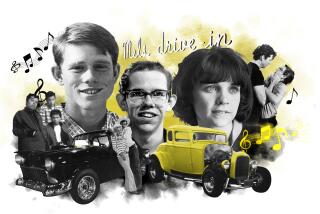The original ‘Ghost in the Shell’ was a watershed film in animation history
- Share via
Mamoru Oshii’s 1995 Japanese sci-fi epic “Ghost in the Shell” ranks as a watershed film in animation history.
A moody, provocative adventure set in a dystopic future, “Ghost” defined cyberpunk, spawned a string of sequels and TV series, and influenced films on both sides of the Pacific. Last year, protests erupted when Paramount announced a live-action remake starring Scarlett Johansson as the crime-fighting cyborg, Maj. Motoko Kusanagi. That film opens Friday.
An agent for Public Security Section 9 who suggests a cross between a Playboy centerfold and the Terminator, Maj. Kusanagi battles the hacker known only as “The Puppet Master.” But her real quest is of self-discovery: Does her “Ghost,” her essential being, reside in the organic brain within her largely prosthetic body or is it part of the Web? Which is more real: the physical world or the electronic one?
Roland Kelts, the author of “Japanamerica: How Japanese Pop Culture Has Invaded the U.S.,” said the original “Ghost” “introduced American audiences to the philosophical risk-taking and literary sophistication of Japanese animation. The film is about defending against malicious hackers, and the fluidity of gender identities — making it almost unbearably prescient two decades later.”
“Ghost” began as a manga — a Japanese graphic novel — by Masamune Shirow that was popular among animators.
“I figured it would eventually be animated, and that I would likely end up directing the animated adaptation,” Oshii said in a recent interview conducted via email. “I tried to make Shirow’s abstruse work as easy to understand as possible, but in spite of my efforts, it seems to have a reputation as a difficult film. It wasn’t very well received when it first hit theaters in Japan, so I was taken aback by its reception in the United States. Its ongoing popularity shocks me, frankly: I never thought of it as something audiences would keep watching for such a long time.”
He speculated on the reasons for that success: “Real and unreal worlds are a dramatic theme as old as time: Humans are by nature unable to live in anything but a virtual world, and it will never be possible to prove that one’s own reality is the same as another person’s.”
Many recent Japanese animated features deal with shifting identities and uncertain realities. But Oshii seemed skeptical about his work affecting other filmmakers. “Perhaps the influence is more about directorial aspects than about the ideas [‘Ghost’] explores,” he said. “People have told me about the similarities between my film and ‘The Matrix’ with annoying frequency, but that series is based on the Wachowskis’ own worldview.
“Ultimately, all movies begin as copies of others, and it’s impossible to avoid consciously or unconsciously copying things from other works,” he added. “Any film set in a near-future world is influenced to some degree by ‘Blade Runner,’ but I did my best to make [‘Ghost’] different from it. In terms of the film’s style, I drew more from ‘hard-boiled’ Hollywood movies.”
The casting of Johansson, a white actress, as a quintessentially Japanese character created a storm in social media about “whitewashing.” (The name Kusanagi is taken from the sacred sword that is part of the Imperial Regalia of Japan.) An online petition calling on the studio to “reconsider casting Scarlett Johansson in Ghost in the Shell and select actors who are truer to the cast of the original film” garnered over 100,000 signatures.
That controversy did not extend to Japan. “Asian Americans and anime fans outside of Japan yelped in anger and disbelief when Johansson was announced as the lead,” Kelts said. “But in Japan, the casting choice is largely perceived as shrewd: She’s a marquee name who may sell tickets; a bit funny, since she’s about as Japanese as a Big Mac.”
Oshii said he’s eager to see Johannson’s interpretation of the character: “I’m a fan of hers, so I’m quite looking forward to seeing what kind of woman her Major will be. I think it’s the best possible casting.”
More to Read
Only good movies
Get the Indie Focus newsletter, Mark Olsen's weekly guide to the world of cinema.
You may occasionally receive promotional content from the Los Angeles Times.








